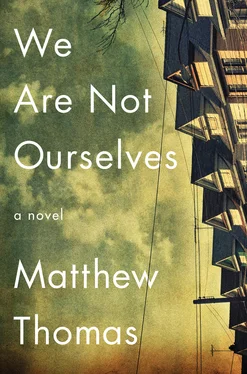“I also walked eight guys.”
“His control is an issue, there’s no denying it. He was pitching out of jams the whole game. He threw a ton of pitches.”
As if on cue, Connell rubbed his shoulder.
“But the sky’s the limit. A lefty with this kind of velocity? If he keeps working at it, he’s going to be a force.”
She waited for Ed to transition into the discussion of the disease. She caught his eye; he shook his head to say the plan was off. She tried to indicate displeasure, but he looked down at his soup to avoid her gaze.
“Ed,” she said, coughing. He looked up.
Connell’s eyes were heavy with fatigue. Ed stood up and put his hand on Connell’s head for a second and tousled his locks affectionately. He walked over to the sink and gazed out the window.
“What’s up? You guys fighting again?”
“No,” Ed said, still looking out the window. “Just listen to your mother.”
“You’re getting older now,” she said. “You’re getting to the point where you can hear adult things.” Connell sat up straighter in his seat. “The things adults talk about. What your father and I talk about.”
“Please don’t tell me this is about the birds and the bees. I’m way too old for that.”
She couldn’t hold back a thin, sad smile. She felt a lump in her throat. “We’ve got some bad news,” she said.
The boy’s jocular expression faded. “What is it?”
“It has to do with your father’s health,” she said after a bit.
Ed turned around and walked back toward the table. He sat. “What your mother is trying to say is that I have been diagnosed with Alzheimer’s disease.”
“Do you know what that is?” she asked.
“Yeah.” He looked back and forth between them. “It’s where you forget things.”
“Yes.”
“Isn’t that what old people get?”
“Sometimes,” she said. “Most of the time. But sometimes it happens to younger people.”
“Are you going to be okay?”
“There’s not a lot of medicine out there,” he said. “I’m on some experimental drugs. We’ll see. But it’s going to get worse.”
“Are you scared?”
This was the first time she’d seen anyone ask Ed how it affected him personally. It had always been questions about the illness. She hadn’t even asked him herself.
Ed straightened up. His eyes got a crinkly, philosophical look in them. “Sometimes I am, sure,” he said. “That’s part of it, no question about it.” He looked at the sugar bowl, the top of which he’d been clacking like a cymbal. “I like my life. I love my life. I don’t want to lose it.”
“Aren’t you too young for this?”
“If you’re asking me, yes,” he said. “If you’re asking the disease, no.”
“How quickly will it get worse?”
“Honey,” she said to him, “don’t pepper your father with questions.”
Ed put up a hand to quiet her.
“It could be quick,” he said. “It could be years. Every case is different.”
Connell seemed to chew on what he’d heard for a little while.
“Is there going to be a time when you don’t know who I am?” he asked.
Ed’s face took on a fierce expression, as though the question had angered him. She thought to intervene, but then he rose from his seat and leaned down to put his arms around the boy.
“I will always know who you are,” Ed said, kissing the top of his head. “I promise you that. Even if you think I don’t know, even if I seem not to. I will always know who you are. You’re my son. Don’t you ever forget that.”
“You neither,” he said, rising to hug his father.
She started clearing the dishes.
“Mom,” Connell said. He held out his gangly arm to her.
She walked over and stood near them. Connell seemed to urge her to join them in some sort of embrace. She had wanted him to hear, and now that he’d heard, she wanted him to come to terms with it and carry on stoically, but he was a different kind of creature from her. She and Ed had worked to give him an easier life than they’d had. Sometimes she wondered if she’d erred in not making him tougher.
The idea of a group hug embarrassed her and she couldn’t comply. There was going to be more darkness than hugs could begin to dispel. She thought of this embrace he was offering as the come-on of a huckster selling a spurious remedy. She gave him three quick, sharp pats on the back, as if to punctuate some unstated conclusion, and headed upstairs.
After they’d finally told Connell, she could talk openly with her girlfriends about Ed’s condition. She called them every night — Ruth, Cindy, Marie, Kelly, Kathy, her aunt Margie — going through the lineup, dialing a new number the instant she’d hung up with the first. She didn’t want to be interrupted once she’d started, so she waited to make the calls until after dinner, when Ed was in his study grading lab reports and writing out lectures. Her friends invariably ended whatever calls they were on when she rang through. She didn’t always know what she was going to talk about when she picked up the phone, but the conversations followed their own rhythms, and they always had to do with Ed. She didn’t even try to talk about other things. She thought if she talked it out enough, she could make it more familiar, less overwhelming, less frightening.
Whenever she called the McGuires and Frank answered, he handed it right to Ruth. Once, about a month after the dinner at which they’d told Ruth and Frank and the others about Ed, Frank annoyed her with the way he rushed off, and she asked Ruth to hand the phone back to him.
“Where the hell did you go?” she asked. “Why haven’t you called? Why hasn’t he seen you? Why haven’t you taken him out for a beer? Why haven’t any of you goddamned guys taken him out? He’s in that study night after night.”
“I’m having a hard time dealing with it.”
“He knows that. Just call him and say hello.”
“I will,” Frank said.
Frank didn’t call, though, and a week later she got Ruth to put him on. She pretended Frank had called and handed the phone to Ed. She was afraid Ed would notice that the phone hadn’t rung, but he just took the phone and started talking to Frank like a teenager, his excitement palpable. She listened to Ed’s end of the conversation, which lasted an hour. Nothing about the disease came up. That was one difference between men and women. Men got along fine without revealing anything. She almost admired them for it. The downside was that they retreated to their islands.
When she took the phone back from Ed, she made Frank promise to call Ed again soon, but Frank didn’t call, and the next time they went to the McGuires’, Frank hardly spoke at dinner, and they left right after dessert.
• • •
Eileen had been telling Ruth about the anxiety dreams she was having about all her teeth falling out and her skin peeling off her body, when Ruth surprised her by suggesting she see a psychologist. She was amazed to hear Ruth speak of the positive experience she’d had in therapy. She didn’t even know Ruth had ever been in therapy. It was nearly impossible to imagine. It wasn’t that Ruth was a stone; she was in fact tirelessly empathetic when listening to the troubles and pains of others, and she always made time for her friends. It was just that she herself never gave anything away. You wouldn’t catch her crying if you tied her up and strangled her cats before her eyes one at a time. For years, Eileen had taken at face value Ruth’s assertion that, having more or less raised her younger siblings, she’d decided she was done bringing children up. Then, late one night when the men were asleep, Ruth admitted she’d been terrified to wreck a kid’s life with drink the way her mother had done. Ever since, when Eileen saw Ruth looking at Connell with affection, she knew there was more in Ruth’s heart than she’d admit to anyone, including Frank.
Читать дальше
Конец ознакомительного отрывка
Купить книгу












